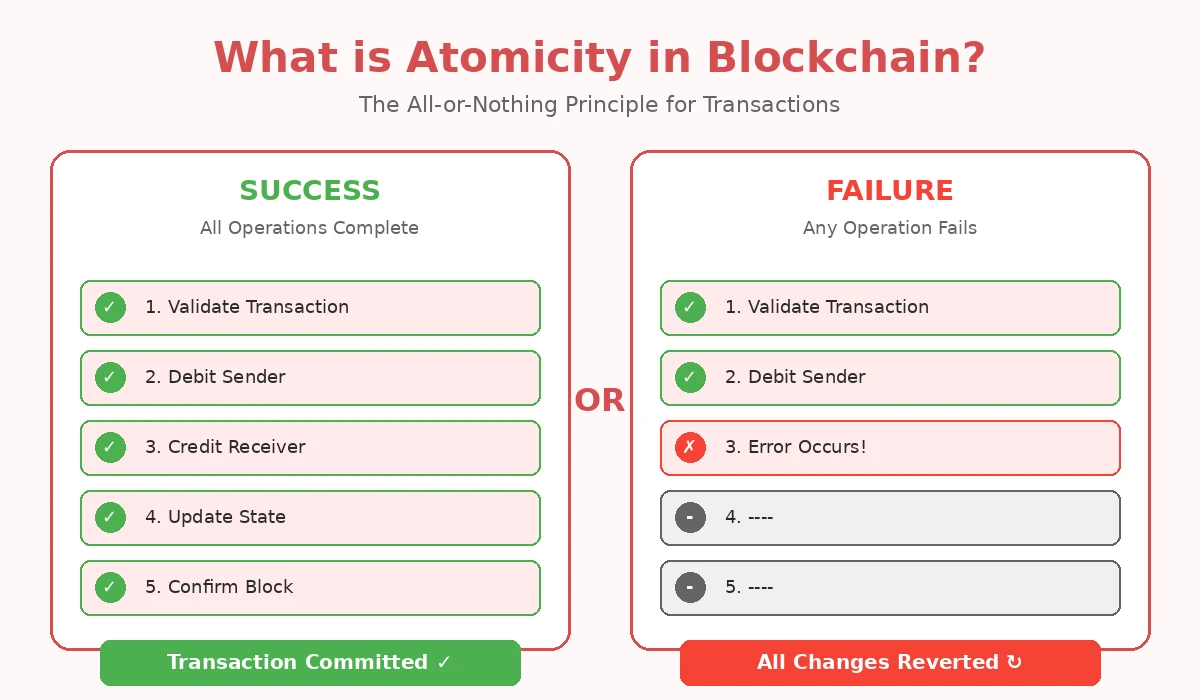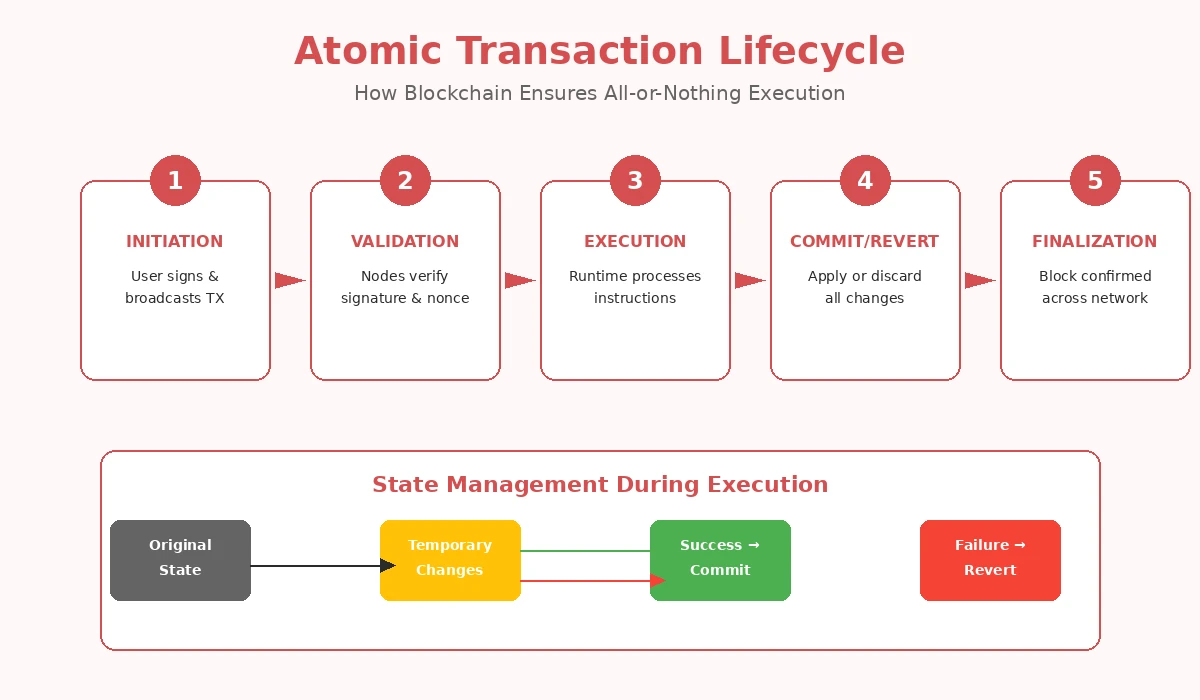Key Takeaways
- Atomicity ensures blockchain transactions either complete fully or do not execute at all, eliminating partial state changes.
- The atomic transaction lifecycle includes initiation, validation, execution, and finalization phases that developers must understand.
- Smart contract development relies heavily on atomicity to prevent fund losses and maintain data consistency.
- Cross-chain atomic swaps use time-locked contracts to enable trustless exchanges between different blockchains.
- Implementing proper atomicity patterns reduces vulnerabilities like reentrancy attacks and race conditions.
- Two-Phase Commit protocols and consensus mechanisms work together to achieve atomicity in distributed blockchain networks.
When you send cryptocurrency from your wallet, have you ever wondered what stops the transaction from getting stuck halfway? What prevents a scenario where your account gets debited but the recipient never receives the funds? The answer lies in a fundamental principle called atomicity.
Atomicity is not just a technical term that blockchain developers throw around. It forms the backbone of every reliable blockchain system you interact with today. From simple token transfers to complex decentralized finance protocols, atomicity keeps everything running smoothly and predictably.
This article breaks down atomicity from both execution and development perspectives. Whether you are building your first smart contract or architecting enterprise blockchain solutions, understanding atomicity will help you create more robust and secure applications. At Nadcab Labs, our team has spent over 8 years working with blockchain systems, and we have seen firsthand how proper atomicity implementation separates reliable platforms from ones that fail under pressure.
What is Atomicity in Blockchain Technology?

Atomicity comes from the word “atom,” which means something that cannot be divided. In blockchain and database systems, atomicity refers to the property where a transaction is treated as a single unit that either succeeds completely or fails completely. There is no middle ground.
Think about it this way. When you withdraw money from an ATM, two things need to happen. First, your bank account balance decreases. Second, the machine dispenses cash. Atomicity ensures both actions happen together or neither happens at all. If the power goes out after your balance decreases but before cash comes out, the system rolls back and restores your original balance.
According to Wikipedia’s explanation of database atomicity, this concept has been a cornerstone of reliable computing systems for decades. Blockchain technology adopted and adapted this principle to work in decentralized environments where no single authority controls the transaction flow.
The concept becomes more interesting when you consider that blockchain networks have multiple nodes processing transactions simultaneously. Each node must agree on the outcome, and atomicity ensures that all nodes see the same consistent state after every transaction.
Understanding Atomicity from a Developer’s Perspective
For blockchain developers, atomicity is not just a nice-to-have feature. It directly impacts how you write smart contracts, handle errors, and design transaction flows. Getting atomicity wrong can lead to lost funds, corrupted data, and unhappy users.
When you write a smart contract function that performs multiple state changes, you rely on the underlying blockchain to guarantee atomicity. If your function transfers tokens, updates a balance mapping, and emits an event, all three operations either complete together or none of them persist.
Here is what this means in practice. Suppose you are building a decentralized exchange. A swap function needs to take tokens from the user, calculate the exchange rate, and send different tokens back. Without atomicity, you could end up taking tokens from users without giving them anything in return if something fails midway.
Developers working on flash loan implementations understand atomicity deeply. Flash loans only work because the entire borrow-use-repay cycle happens within a single atomic transaction. If the borrower cannot repay, the whole transaction reverts, and it is as if the loan never happened.
Common Atomicity Patterns in Smart Contract Development
Experienced developers follow specific patterns to leverage atomicity effectively. The checks-effects-interactions pattern ensures that your contract checks conditions first, makes state changes second, and interacts with external contracts last. This ordering works with atomicity to prevent reentrancy vulnerabilities.
Another pattern involves batching multiple operations into single transactions. Instead of making users sign multiple transactions that could partially succeed, you bundle everything together. If any part fails, the user’s state remains unchanged, and they can try again without dealing with a messy partial state.
The Atomic Transaction Execution Lifecycle

Understanding how atomic transactions execute helps developers write better code and debug issues faster. Every blockchain transaction goes through distinct phases, and atomicity guarantees apply throughout this process.
| Phase | Description | Atomicity Role |
|---|---|---|
| Initiation | User signs and broadcasts transaction to the network | Transaction is marked as pending with no state changes yet |
| Validation | Nodes verify signature, nonce, and gas availability | Invalid transactions rejected before any execution begins |
| Execution | EVM or runtime processes transaction instructions | State changes held in temporary storage until completion |
| Commit or Revert | System decides to apply or discard changes | All-or-nothing application ensures consistency |
| Finalization | Block containing transaction gets confirmed | Atomic changes become permanent across the network |
During the execution phase, the blockchain runtime creates a snapshot of the current state. As your transaction runs, changes accumulate in a temporary area. Only when execution completes successfully do these changes merge into the actual blockchain state. If anything goes wrong, the runtime simply discards the temporary changes and keeps the original state.
This mechanism explains why failed transactions still cost gas on networks like Ethereum. The network nodes spent computational resources executing your transaction up to the point of failure. They need compensation for that work, even though the state changes did not persist.
Why Atomicity Matters for Blockchain Applications
Atomicity is not just a technical nicety. It directly impacts user trust, application security, and system reliability. Without proper atomicity guarantees, blockchain applications would be unusable for any serious financial or data-sensitive operations.
Protecting User Funds
Consider a token swap on a decentralized exchange. The operation involves taking tokens from the user, updating liquidity pool balances, calculating output amounts, and sending tokens to the user. If this sequence could partially complete, users might lose their input tokens without receiving anything back.
Atomicity eliminates this risk entirely. Either the full swap happens, or the user keeps their original tokens. This guarantee is why people trust decentralized exchanges with billions of dollars in trading volume.
Maintaining Data Integrity
Blockchain applications often involve complex data relationships. A lending protocol needs to track collateral deposits, loan amounts, interest accruals, and liquidation thresholds. These values must stay consistent with each other.
Atomicity ensures that updates to related data happen together. You cannot have a situation where the collateral record shows a deposit but the available borrowing limit does not reflect it. Such inconsistencies would break the protocol’s accounting and potentially enable exploits.
Enabling Complex Financial Operations
Modern DeFi protocols perform surprisingly complex operations within single transactions. Yield aggregators might harvest rewards from one protocol, swap them through multiple pools, and deposit the results into another protocol. All of this happens atomically.
The blockchain development services we provide at Nadcab Labs often involve designing such multi-step operations. Our engineers ensure that these complex flows maintain atomicity throughout, protecting users even when interacting with multiple protocols simultaneously.
Build Secure Blockchain Solutions with Atomic Guarantees
Need help implementing bulletproof atomicity in your blockchain project? Our team brings 8+ years of hands-on experience in building reliable decentralized systems.
Atomicity in Distributed Blockchain Systems
Achieving atomicity becomes significantly more challenging when multiple independent computers must agree on outcomes. Blockchain networks are distributed systems where no single node has complete control over transaction processing.
Traditional databases achieve atomicity using transaction logs and locks. A single database server can simply hold changes in a buffer and commit them all at once. But what happens when you have thousands of nodes spread across the globe, each maintaining their own copy of the data?
Blockchain networks solve this through consensus mechanisms. Before any transaction becomes final, a sufficient number of nodes must agree that it executed correctly. This agreement process ensures that all honest nodes end up with the same state, maintaining atomicity across the distributed network.
Two-Phase Commit in Blockchain Context
The Two-Phase Commit protocol, often abbreviated as 2PC, provides a structured way to achieve atomicity across multiple participants. While blockchain networks do not use 2PC directly, understanding this protocol helps explain how distributed atomicity works.
In the first phase, a coordinator asks all participants to prepare for the transaction. Each participant validates the transaction locally and locks any required resources. Participants respond with either a ready signal or an abort signal.
In the second phase, if all participants are ready, the coordinator sends a commit message. Everyone applies their changes permanently. If any participant signaled abort, the coordinator tells everyone to roll back, and the transaction never happened.
Blockchain consensus mechanisms like Proof of Activity achieve similar outcomes through different means. Validators propose and vote on blocks containing transactions. Once a block reaches consensus, all included transactions become final atomically.
Atomicity Comparison: Traditional Databases vs Blockchain
| Aspect | Traditional Databases | Blockchain Systems |
|---|---|---|
| Control Model | Centralized server manages transactions | Distributed nodes reach consensus |
| Rollback Mechanism | Transaction logs enable undo operations | State reverts to pre-transaction snapshot |
| Finality Speed | Immediate after commit | Requires block confirmations |
| Trust Requirement | Trust in database administrator | Trustless through cryptographic verification |
| Failure Handling | Server recovery procedures | Network continues with remaining nodes |
The key difference lies in trust assumptions. Traditional databases trust a central authority to maintain atomicity. Blockchain systems achieve atomicity without trusting any single party, which is why they work for financial applications where participants might not trust each other.
Real World Examples of Blockchain Atomicity
Abstract concepts become clearer with concrete examples. Let us look at how atomicity plays out in actual blockchain applications that people use every day.
Cryptocurrency Transfers
The simplest example of blockchain atomicity is a basic cryptocurrency transfer. When you send Bitcoin or Ethereum to another address, the transaction decreases your balance and increases the recipient’s balance. These two changes are atomic.
Without atomicity, you could have a situation where your balance decreases but the recipient never receives the funds. The cryptocurrency would simply vanish, which would make the entire system useless for value transfer. Atomicity guarantees that value is conserved across every transaction.
Understanding the differences between traditional finance and crypto helps appreciate why this matters. Our article on fiat versus crypto safety explores how blockchain’s atomic guarantees compare to traditional banking systems.
Decentralized Exchange Swaps
Token swaps on platforms like Uniswap involve multiple state changes within a single transaction. The swap function must update the liquidity pool reserves, transfer tokens from the user to the pool, transfer different tokens from the pool to the user, and update internal accounting variables.
All these changes happen atomically. If the user does not have enough tokens, if the slippage exceeds their tolerance, or if any other condition fails, the entire swap reverts. The user keeps their original tokens, and the pool state remains unchanged.
Smart Contract Deployments
Deploying a smart contract is itself an atomic operation. The deployment transaction either succeeds completely, creating a new contract at a specific address with all its initial state, or fails completely, leaving no trace on the blockchain.
This atomicity extends to constructor logic. If your constructor performs setup operations that fail partway through, the entire deployment reverts. You will not end up with a partially initialized contract that could behave unpredictably.
NFT Marketplace Transactions
When someone purchases an NFT on a marketplace, atomicity ensures that payment and ownership transfer happen together. The buyer’s payment goes to the seller, and the NFT ownership record updates to show the buyer as the new owner. Neither change happens without the other.
Marketplace contracts often involve additional complexity like royalty payments to original creators and platform fees. Atomicity guarantees that all these fund transfers complete together or none of them do. Sellers never lose their NFT without receiving payment, and buyers never pay without receiving ownership.
Cross-Chain Atomic Swaps and Bridge Contracts
Atomicity becomes particularly challenging when transactions span multiple independent blockchains. If you want to exchange Bitcoin for Ethereum, you are dealing with two separate networks that do not directly communicate with each other.
Cross-chain atomic swaps solve this problem using a technique called Hash Time Locked Contracts, or HTLCs. The basic idea involves cryptographic locks and time constraints that ensure either both sides of the swap complete or both sides can reclaim their original funds.
Here is how it works. Suppose Alice has Bitcoin and wants Ethereum, while Bob has Ethereum and wants Bitcoin. Alice creates a secret and generates a hash of that secret. She locks her Bitcoin in a contract that Bob can claim only if he reveals the correct secret within a time limit.
Bob sees Alice’s contract and creates a similar contract on Ethereum, locking his Ether with the same hash. Alice claims Bob’s Ether by revealing her secret. When she does, Bob learns the secret and can claim Alice’s Bitcoin. The swap completes atomically in effect, even though it happens across two chains.
If Alice never reveals her secret, both time locks eventually expire, and everyone gets their original funds back. The atomicity guarantee holds even across blockchain boundaries. Our detailed guide on bridge contracts explains more about how these cross-chain mechanisms work.
Similarly, sidechain implementations must carefully handle atomicity when moving assets between the main chain and side chain. The peg-in and peg-out processes require atomic guarantees to prevent double-spending or asset loss.
Security Implications of Atomicity in Development
Understanding atomicity is crucial for writing secure smart contracts. Many famous exploits happened because developers did not fully understand how atomicity interacts with external calls and state management.
Reentrancy Attacks and Atomicity
The infamous DAO hack of 2016 exploited a reentrancy vulnerability. The contract sent Ether to users before updating their balance. An attacker could create a malicious contract that, upon receiving Ether, immediately called back into the original contract to withdraw again. Since the balance had not updated yet, the contract allowed another withdrawal.
This happened because the developer expected atomicity at the wrong level. Each individual call was atomic, but the combination of calls within the transaction allowed state manipulation. The fix involves understanding that atomicity applies to the entire transaction, including any external calls that transaction makes.
Modern smart contracts prevent reentrancy by following the checks-effects-interactions pattern. Update all state variables before making external calls. Even if an attacker tries to reenter, they encounter the already-updated state and cannot exploit the contract.
Front-Running and Transaction Ordering
Atomicity guarantees that your transaction executes completely, but it does not guarantee when your transaction executes relative to others. Miners or validators can order transactions within a block however they choose, within protocol constraints.
This creates opportunities for front-running attacks. Someone sees your pending transaction to buy a token and submits their own transaction with higher gas to execute first. After their purchase raises the price, your transaction executes at a worse rate.
Developers mitigate front-running through commit-reveal schemes, where users commit to an action in one transaction and reveal the details in a later transaction. The atomicity of each transaction remains intact, but the overall protocol protects against ordering manipulation.
Best Practices for Implementing Atomicity
At Nadcab Labs, our blockchain developers follow specific practices to ensure proper atomicity in every project. These practices have been refined through years of building production systems that handle real value.
| Practice | Description | Benefit |
|---|---|---|
| Checks-Effects-Interactions | Validate inputs, update state, then make external calls | Prevents reentrancy vulnerabilities |
| Explicit Revert Messages | Use require with descriptive error strings | Easier debugging when transactions fail |
| Guard Against Zero Values | Check for zero addresses and amounts early | Fails fast before wasting gas |
| Use Safe Transfer Libraries | Leverage tested libraries like OpenZeppelin | Handles edge cases in token transfers |
| Comprehensive Testing | Test failure cases as thoroughly as success cases | Verifies atomic behavior under all conditions |
Batch Operations for Better User Experience
Users appreciate when they can accomplish multiple actions in a single transaction. Instead of approving tokens in one transaction and then swapping in another, batch the operations together. The atomicity guarantee means either everything succeeds or the user’s state remains unchanged.
This approach also saves gas because transaction overhead is paid once instead of multiple times. When building applications that interact with auction contracts or other time-sensitive systems, batching becomes even more important to ensure users can complete actions reliably.
Handling External Contract Failures
When your contract calls another contract, you must decide how to handle potential failures. Using low-level calls allows you to check the return value and decide whether to revert or handle the failure gracefully.
For critical operations like fund transfers, usually you want failures to revert the entire transaction. For optional operations like logging to external contracts, you might want to continue even if the external call fails. Understanding these tradeoffs helps you design contracts that behave correctly under all circumstances.
Atomicity in Layer 2 and Emerging Technologies
As blockchain technology evolves, atomicity concepts extend to new paradigms like Layer 2 scaling solutions, rollups, and modular blockchain architectures.
Optimistic and ZK Rollups
Rollups process transactions off the main chain but inherit the security of the underlying blockchain. Atomicity within a rollup works similarly to the base layer, with transactions either completing fully or reverting.
The interesting complexity comes when moving assets between the rollup and the main chain. These bridge operations must maintain atomicity across what are effectively two different execution environments. Optimistic rollups use challenge periods to ensure atomic consistency, while ZK rollups use cryptographic proofs.
Serverless Blockchain Applications
Modern blockchain applications often combine on-chain smart contracts with off-chain serverless computing infrastructure. Developers must carefully consider how atomicity guarantees extend or do not extend across this boundary.
On-chain operations remain atomic, but coordinating with off-chain systems requires additional patterns like eventual consistency and compensating transactions. A serverless function that triggers on blockchain events must handle cases where the on-chain transaction succeeded but the off-chain processing failed.
Gaming and Metaverse Applications
Blockchain games and metaverse platforms face unique atomicity challenges. A single player action might involve multiple NFT transfers, token payments, and state updates. If you have developed a metaverse game, you understand how important it is that all these changes happen together.
Games also deal with the perception of atomicity from the player’s perspective. Even if the blockchain transaction is atomic, the player experiences loading screens and confirmations. Good UX design acknowledges the atomic nature of transactions while managing player expectations during the confirmation process.
Atomicity’s Impact on Enterprise Blockchain Adoption
Enterprise adoption of blockchain technology depends heavily on atomicity guarantees. Businesses need to know that their transactions will complete reliably or fail cleanly without leaving systems in inconsistent states.
The impact of blockchain on manufacturing industries illustrates this well. Supply chain tracking involves multiple parties updating records as goods move between locations. Atomicity ensures that ownership transfers and location updates happen together, maintaining accurate records throughout the supply chain.
Financial institutions have particularly high requirements for transactional integrity. According to Investopedia’s coverage of atomic swaps, the ability to exchange assets atomically without counterparty risk represents a significant advancement over traditional settlement processes that can take days.
Nadcab Labs works with enterprises to implement blockchain solutions that meet their strict reliability requirements. Our experience shows that understanding atomicity at a deep level is essential for building systems that perform correctly under all conditions, including network congestion, node failures, and malicious attacks.
The Future of Atomicity in Blockchain
Research continues to push the boundaries of what is possible with atomic transactions in distributed systems. Several developments will shape how developers work with atomicity in coming years.
Improved Cross-Chain Protocols
Current cross-chain atomic swaps work but involve multiple transactions and waiting periods. New protocols aim to reduce friction while maintaining strong atomicity guarantees. Solutions like Cosmos IBC and Polkadot XCMP provide native cross-chain messaging that simplifies atomic operations spanning multiple chains.
Account Abstraction and Enhanced Atomicity
Account abstraction proposals like ERC-4337 change how transactions work at a fundamental level. Smart contract wallets can batch multiple operations into single transactions more easily, improving both atomicity guarantees and user experience.
These changes also enable new patterns like sponsored transactions, where one party pays gas for another party’s transaction. The atomicity guarantee extends across all operations within the bundled transaction, regardless of who pays for execution.
Formal Verification of Atomic Properties
As blockchain systems handle more value, formal verification becomes increasingly important. Tools that can mathematically prove that a smart contract maintains atomic properties under all possible inputs provide much stronger guarantees than testing alone.
This represents the cutting edge of blockchain development. At Nadcab Labs, we are investing in formal verification capabilities to provide our clients with the highest level of assurance that their contracts behave correctly.
Partner with Blockchain Experts Who Understand Atomicity
From smart contract development to enterprise blockchain integration, Nadcab Labs delivers solutions built on solid technical foundations. Let us help you build something reliable.
Conclusion
Atomicity forms the bedrock of reliable blockchain systems. Without it, users could not trust that their transactions would complete correctly. Smart contracts could not safely manage complex operations. Cross-chain exchanges would be impossible without trusted intermediaries.
For developers, understanding atomicity means understanding how blockchain runtimes execute transactions, how to design contracts that leverage atomic guarantees, and how to avoid pitfalls that can lead to vulnerabilities. It means knowing the difference between what happens within a transaction and what happens across transactions.
For businesses evaluating blockchain solutions, atomicity provides the reliability guarantees necessary for serious applications. Knowing that operations either complete fully or do not happen at all enables confident deployment of systems that handle real value.
At Nadcab Labs, our 8+ years of blockchain development experience includes deep work with atomicity at every level. From designing token transfer mechanisms to building complex DeFi protocols, we understand how to create systems that behave correctly under all conditions. Whether you are starting a new blockchain project or improving an existing one, we can help you build something that your users can trust.
Frequently Asked Questions
When an atomic transaction fails, the blockchain reverts all state changes to their values before the transaction started. The user’s wallet balance, smart contract storage, and all other affected data return to their previous state. However, the gas fee for the failed transaction is still consumed because network nodes spent computational resources attempting to execute the transaction. This ensures that attackers cannot spam the network with failing transactions for free while still protecting users from partial state changes that could result in lost funds or corrupted data.
All major blockchain platforms provide atomicity guarantees, but implementation details vary. Ethereum executes smart contract transactions atomically within the EVM, with gas limits determining maximum complexity. Solana uses a parallel transaction processing model where transactions that do not conflict can execute simultaneously, but each individual transaction remains atomic. Bitcoin provides atomicity at the UTXO level, where spending inputs and creating outputs happen together. The practical differences affect how developers structure their applications but the core guarantee remains the same across platforms.
The underlying blockchain atomicity cannot be broken, but smart contract bugs can create situations that feel like atomicity failures from the user’s perspective. Reentrancy attacks exploit the fact that external calls can execute code before state updates complete, allowing attackers to manipulate contract behavior within a single atomic transaction. The transaction itself remains atomic, but the outcome differs from what the developer intended. Proper coding patterns like checks-effects-interactions and reentrancy guards prevent these vulnerabilities while maintaining correct atomic behavior.
Consensus mechanisms and atomicity work together to ensure reliable blockchain operation. Atomicity guarantees that individual transactions either complete fully or not at all. Consensus mechanisms ensure that all honest nodes agree on which transactions completed and in what order. Without consensus, different nodes might have different views of whether a transaction succeeded. Without atomicity, even agreed-upon transactions might leave the system in inconsistent states. Proof of Work, Proof of Stake, and other consensus methods all preserve atomicity guarantees while achieving network-wide agreement.
Flash loans are perhaps the most impressive demonstration of blockchain atomicity in action. They allow users to borrow millions of dollars without any collateral, as long as the loan is repaid within the same transaction. If the borrower cannot repay for any reason, the entire transaction reverts, and the loan never happened from the blockchain’s perspective. This would be impossible in traditional finance where loan disbursement and repayment are separate events. Flash loans enable arbitrage, liquidations, and collateral swaps that require large capital but carry minimal risk to lenders.
Cross-chain transactions involve multiple independent blockchains that do not share state or execution environments. A single atomic transaction cannot span multiple chains because each chain only controls its own state. Hash Time Locked Contracts solve this by creating linked conditional transactions on each chain. Both parties lock funds with the same cryptographic condition and time limits. When one party reveals the secret to claim funds on one chain, the other party can use that revealed secret to claim funds on the other chain. The result achieves atomic behavior across chains through clever protocol design rather than shared execution.
Reviewed & Edited By

Aman Vaths
Founder of Nadcab Labs
Aman Vaths is the Founder & CTO of Nadcab Labs, a global digital engineering company delivering enterprise-grade solutions across AI, Web3, Blockchain, Big Data, Cloud, Cybersecurity, and Modern Application Development. With deep technical leadership and product innovation experience, Aman has positioned Nadcab Labs as one of the most advanced engineering companies driving the next era of intelligent, secure, and scalable software systems. Under his leadership, Nadcab Labs has built 2,000+ global projects across sectors including fintech, banking, healthcare, real estate, logistics, gaming, manufacturing, and next-generation DePIN networks. Aman’s strength lies in architecting high-performance systems, end-to-end platform engineering, and designing enterprise solutions that operate at global scale.







